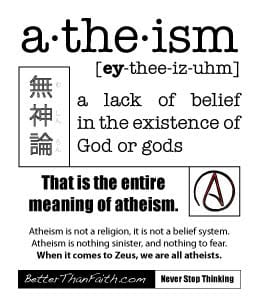
American Atheists describe atheism this way:
Atheism is one thing: A lack of belief in gods.It is simply a rejection of the assertion that there are gods. Atheism is too often defined incorrectly as a belief system. To be clear: atheism is not a disbelief in gods or a denial of gods; it is a lack of belief in gods.
An atheist, then, lacks belief in gods. That’s atheism in a nutshell.
I self describe as an agnostic atheist. Since I don’t possess all knowledge about the existence of one or more deities, I am agnostic on the God question. It is possible that at some point in the future, a god may make itself known to us. Unlikely, but possible.
As far as the extant deities are concerned, I am an atheist. I am convinced that the Abrahamic God is a myth. The same goes for the other gods humans created and worship. I have exhaustively studied the claims of Christianity. I am convinced these claims are false. I can’t imagine any evidence will be presented in the future to move me off the conclusion that the central claims of Christianity are false. (Please see The Michael Mock Rule: It Just Doesn’t Make Sense.)
Last week, I purchased a New Oxford NRSVue Study Bible. What an awesome, beautiful Bible. Don’t worry, I don’t plan on returning to Christianity. I haven’t read the Bible from cover to cover for seventeen years. I thought I would reread it and do some writing about what I learn. One series I want to write will detail the violent God of the Bible. Fun times ahead, Loki-willing. 🙂
Antitheism, also spelled anti-theism, is the philosophical position that theism should be opposed. The term has had a range of applications. In secular contexts, it typically refers to direct opposition to the belief in any deity.
Antitheists are actively opposed to gods and religions.
I am not an antitheist. I am indifferent towards religions that keep to themselves and don’t stick their noses in my life and the lives of other unbelievers. I have Christian friends, mainly liberal believers. I also have acquaintances who are Unitarians or practice earth-based religions. Their religious practices don’t bother me in the least. I am, however, opposed to religions that try to evangelize people, control the government, and force people to live according to their peculiar interpretations of a religious text. Technically, then, I am anti-Evangelical, anti-IFB, anti-Mormon, anti-Jehovah’s Witnesses, and anti- other fundamentalist religions. Such religions are psychologically harmful and can cause physical harm, especially to women and children. Fundamentalism is the problem.
Sadly, some hardcore antitheists consider me a fake atheist or a closeted Christian. If I don’t hate who and what they hate, I am a fraud or a fake. They are, in my opinion, fundamentalist atheists, every bit as repugnant as hardcore Independent Baptist preachers.
How do you self-describe yourself? Please share your thoughts in the comment section.
Bruce Gerencser, 68, lives in rural Northwest Ohio with his wife of 47 years. He and his wife have six grown children and sixteen grandchildren. Bruce pastored Evangelical churches for twenty-five years in Ohio, Texas, and Michigan. Bruce left the ministry in 2005, and in 2008 he left Christianity. Bruce is now a humanist and an atheist.
Your comments are welcome and appreciated. All first-time comments are moderated. Please read the commenting rules before commenting.
You can email Bruce via the Contact Form.
